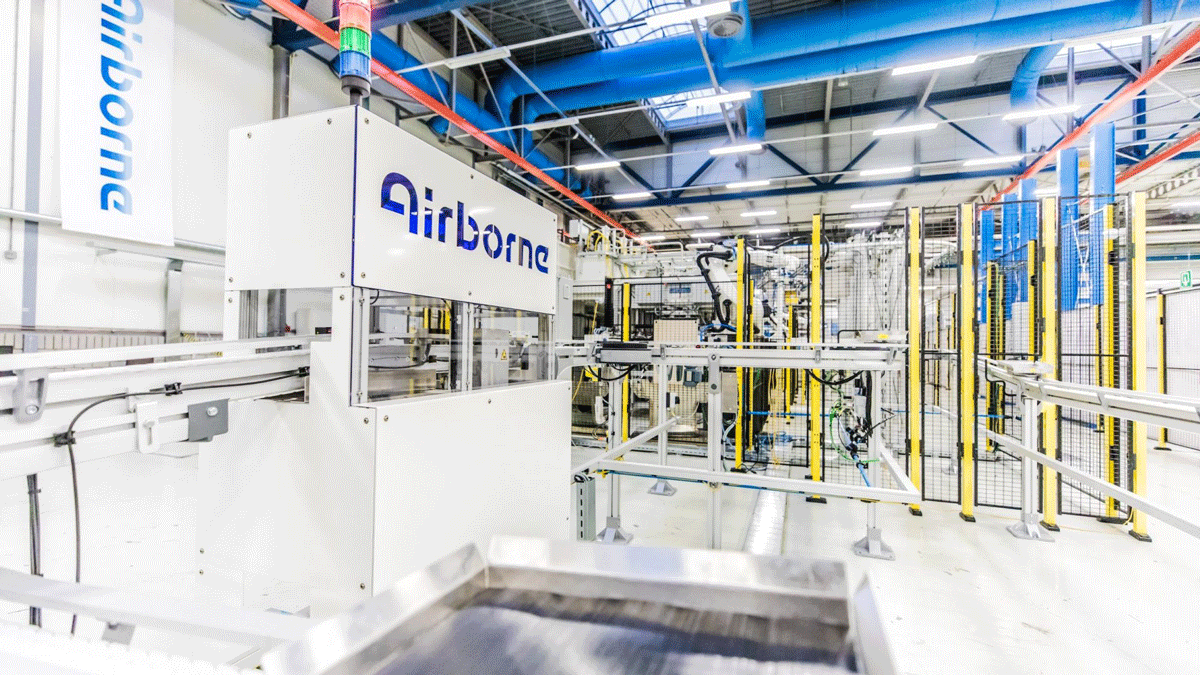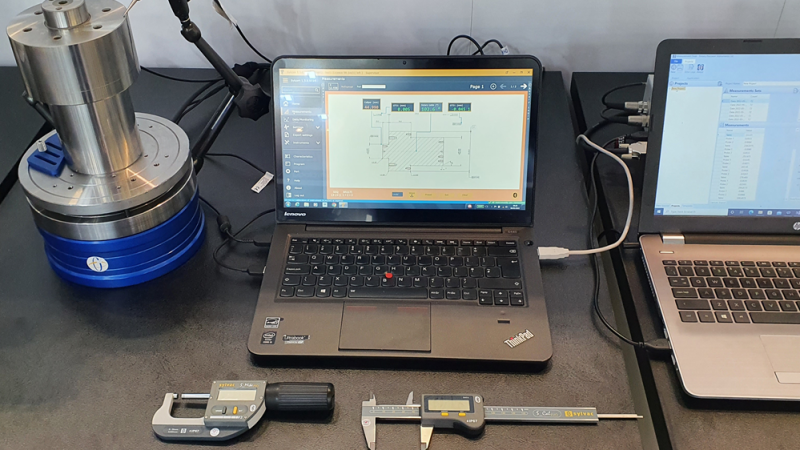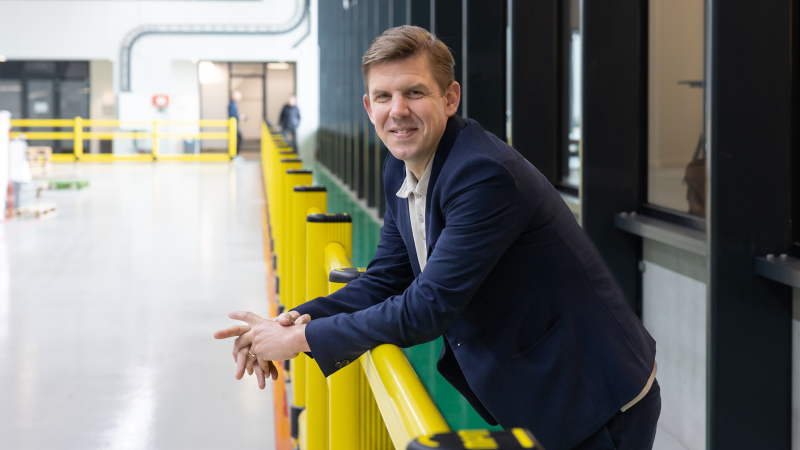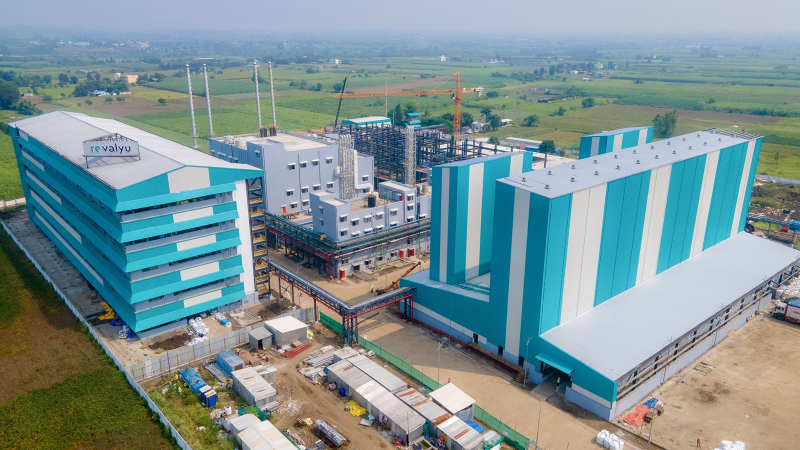The benefits of composite materials are well known within the advanced high-tech industry – superior structural properties, freedom of form, freedom from corrosion, less maintenance and lower mass. Composites are, for example, increasingly used in the aerospace and automotive industries, and play an important role in renewable energy technologies. Airborne is a sought-after partner of companies from across all these sectors.
Headquartered in The Hague, Airborne has wide-ranging experience and know-how developed over 40 years. Having become a globally recognised specialist in the development and production of advanced speciality composite products as well as of automated manufacturing systems for their production, Airborne is well placed to meet the increasing demand for the ‘materials of the future’. In Europe, the company is a market leader in lightweight solar panels for satellites, for example, and a leading manufacturer for launch structures and other parts for the aerospace industry.
Marcus Kremers, Chief Technology Officer, acknowledges that automated systems are now the fastest-growing business line. “A few years ago, our strategy was revised to shift to digital automation, with flexibility and ease of use in mind. Today, the production of highly flexible robotic systems for the manufacturing of composite parts is showing the greatest potential.”
He explains that Airborne uses its two business capabilities to provide customers with the freedom to choose the right option for their particular situation. “Often, when a company develops a new composite product, production rates are low and investment in machines is not economical. In this scenario, we can run automated production for them. When production volume goes up, it may then be the right time to purchase the equipment from us.”
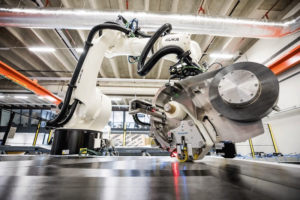 Blazing the trail
Blazing the trail
With its 120 people across two locations in the Netherlands and the UK, Airborne clearly stands out in this fast-developing marketplace. Kremers explains that what distinguishes the company from competitors is, above all, its expertise in the early part of the composite manufacturing process, where the delicate composite materials are converted into laminates and sandwiches, ready to be cured or consolidated into solid, stiff parts.
“In this phase the materials are still fragile and in-depth composite material and process know-how is needed to ensure that the automation leads to a robust, reliable and efficient process. Airborne has developed hardware and software to handle this stage faultlessly.”
The software in itself is another differentiator. Airborne’s digital automation systems are extremely flexible without the need for any programming. “We have put a lot of effort into not only taking the shop floor worker out of the loop, but also the engineer.”
With this in mind, the company pioneered its Automated Ply Placement (APP), a new way of converting composites into multi-material tailored blank laminates. The concept is to cut the materials into the required shapes, pick them with a robotised system and place them on a welding table to create the tailored blank preform.
The system offers multiple benefits – the lay-up process is fully automated and integrated in one system that can handle many different materials, from fabric to metallic layers, something other robotic systems cannot do. It is also ready to use future materials that are coming to the market, such as recycled materials, bio-based materials, or novel material forms. “The system we have developed can work with all composite materials to provide the designer with maximum freedom, “ says Kremers.
Trusted partner
Not surprisingly, Airborne’s solutions are in high demand in the market. The company has been working with leading manufacturers, offering not just engineering and manufacturing services but also consultancy, from the idea and inception.
Just recently, Airbus selected Airborne to renew its cutting room in Germany, with state-of-the-art digital Kit by Light systems to improve operation and material efficiency. The new cutting and kitting lines will include full digital control of the total kitting process to guarantee flexibility, 100% quality control (zero errors), allow dynamic nesting combining multiple parts in a nest and provide more output per cutter and per worker.
“Interestingly, there’s no robot involved. Human operators still do the task, but they are guided by a light system supported by a digital workflow. It is the digital shell that makes the product special,” notes Kremers.
The partnership with Airbus is multifaceted. Last year, Airborne supplied its Automated Ply Placement system to Airbus’s Spanish production plant, to manufacture the dry fibre preforms for RTM structures. The first pick-and-place-based system ever installed in an Airbus factory, it will be used for the automated production of the preforms for the A350 rear fuselage beams and maintenance door frame, made of UD and fabrics.
“In addition to aerospace, our solutions are used in other sectors such as automotive and energy. For example, Siemens Gamesa Renewable Energy has contracted us to engineer and supply an automated system for the manufacturing of composite offshore wind turbine blades. We have also supplied our APP systems to Teijin Automotive Technologies for their factory in France, producing carbon-fibre reinforced polymer doors for Porsche.”
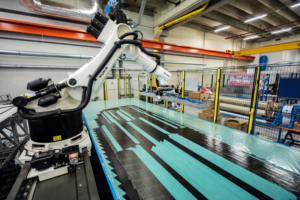 Efficient and sustainable
Efficient and sustainable
The properties composites offer enable manufacturers to build sustainable attributes into projects or products that can lower environmental impact, an important aspect. Flexibility is another sought-after attribute in today’s complex environment, says Kremers.
“A typical aerospace facility is a high-mix environment, with many different products made for different programmes. Our systems include a digital methodology that is very adaptable, so that grouping of parts can be changed on a daily basis, saving a lot of material and reducing waste – an important business driver.”
As increasing demand for better and more sustainable materials opens up new opportunities in the composites industry, Airborne’s growth trajectory is set to continue. “Our next step is to improve our presence in North America. This will potentially be followed by setting up a facility in Asia. The vision is to grow globally,” Kremers concludes.
